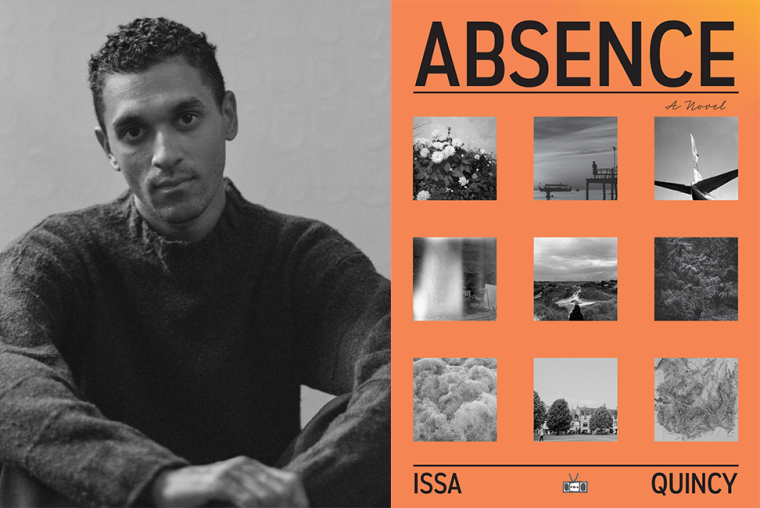This week’s installment of Ten Questions features Issa Quincy, whose debut novel, Absence, is out today from Two Dollar Radio. As a child, an unnamed narrator’s mother reads a poem to him. Throughout his life, the poem reappears enigmatically, in the affecting life experiences of others as they are recounted to him. An eccentric and beloved teacher leaves behind a dark secret after his death. An elderly woman returns to the same hotel on the Tunisian coast every year as an act of remembrance for a disappeared brother. The son of a wealthy Indian businessman, the pariah of his family, finds solidarity and the distant pang of freedom within the letters of an estranged aunt. As we follow a cast of characters on their journeys of self-discovery, Absence evocatively builds a compassionate chorus of nostalgia, attuned to the drama of the quotidian and the phantoms that linger with us. Lucy Ives writes, “Like a magic trick in which centuries emerge from a thimble, this brief and deeply satisfying novel reveals the ongoing miracle of survival—cloaked in the everyday.” Issa Quincy is a British writer. He spent several years working as a film archivist. His poetry has appeared in the London Magazine and been anthologized by New Rivers Press. His fiction has appeared in Transition Magazine and the Kenyon Review. He is currently based in New York City.

Issa Quincy, author of Absence. (Credit: Jim Larsen)
1. How long did it take you to write Absence?
The first draft took me three weeks to write. From that point until printing, it took about three years.
2. What was the most challenging thing about writing the book?
Editing, without a doubt. I love to write; I hate editing. I am trying to learn to love it and so far failing at that.
3. Where, when, and how often do you write?
I mostly write at the desk in my room facing a blank wall. I can’t have a window in front of me. I tend to write from the early evening late into the night for several hours. I write every day.
4. What are you reading right now?
I am reading Anil’s Ghost (Knopf, 2000) by Michael Ondaatje and a collection of Wallace Stevens’s poetry.
5. Which author, in your opinion, deserves wider recognition?
Mathias Énard. He is, to me, the most inventive, wondrous, thought-provoking writer at work right now. He doesn’t shy away from the weighty, moral questions and feeds his work with a riverine knowledge of Eastern and Western philosophy and literature.
6. What is the biggest impediment to your writing life?
Noise.
7. What is one thing that your agent or editor told you during the process of publishing this book that stuck with you?
It wasn’t my agent or editor, but the writer Ali Smith read an early draft and suggested that I recenter the focus of one of the chapters in the novel. That move blew the entire work open in a way I hadn’t been able to perceive before.
8. If you could go back in time and talk to the earlier you, before you started Absence, what would you say?
I would suggest that I read the plays of Adrienne Kennedy sooner. And The Enigma of Arrival (Viking, 1987) by V. S. Naipaul. And more poems by John Ashbery.
9. Outside of writing, what other forms of work were essential to the creation of Absence?
During the writing of Absence I wrote several plays and put together some collections of poems. I tend to work across these different forms, on different projects at the same time. I also make sketchbooks for each project; they are more emotional acts than intellectual ones.
10. What’s the best piece of writing advice you’ve ever heard?
My friend, the writer Xandra Bingley, impressed upon me the importance of simply doing the work and not just talking about it. My mother always says the most important thing is to be honest to the work. And my grandmother always says to me, “Make it straight, like an arrow.” I always keep those shards with me.







